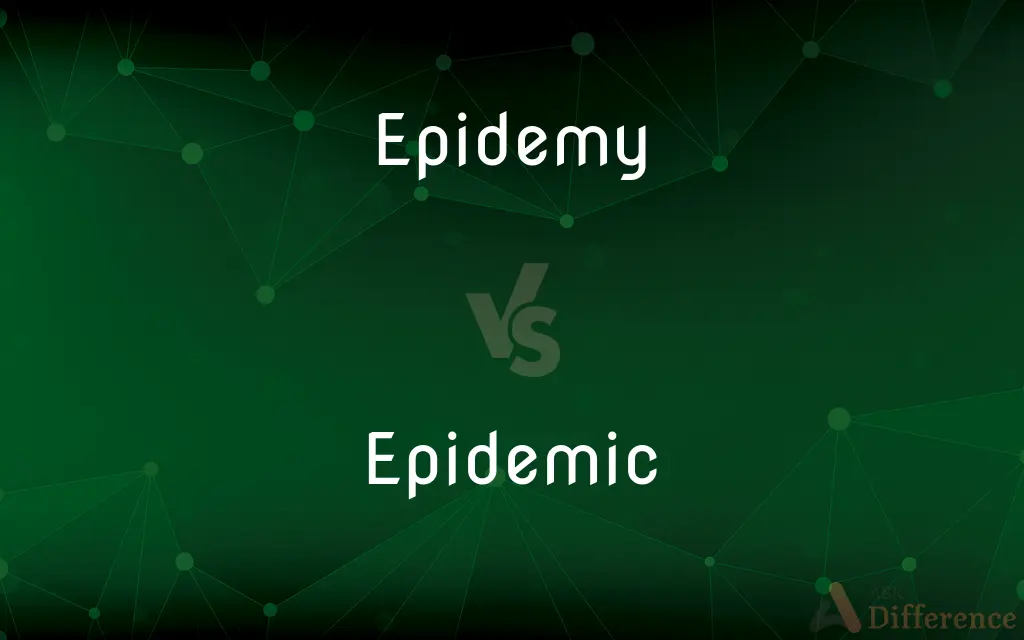Epidemy vs. Epidemic — Which is Correct Spelling?
Edited by Maham Liaqat — By Sumaia Saeed — Updated on April 24, 2024
Epidemy is the incorrect spelling of epidemic. Epidemic refers to a widespread occurrence of an infectious disease in a community at a particular time.

Table of Contents
Which is correct: Epidemy or Epidemic
How to spell Epidemic?

Epidemy
Incorrect Spelling

Epidemic
Correct Spelling
ADVERTISEMENT
Key Differences
Focus on the "dem" sound in the middle, which connects to "demographic," often related to population studies like epidemics.
The word epidemic is closely related to "epidemiology," the study of the spread of diseases.
Epidemy is misspelled; the correct spelling is epidemic, which ends with "ic."
Remember the ending "-ic," common in describing conditions like "pandemic" and "academic."
Only epidemic is recognized in standard dictionaries, not epidemy.
ADVERTISEMENT
How Do You Spell Epidemic Correctly?
Incorrect: I heard about a new epidemy in the news today.
Correct: I heard about a new epidemic in the news today.
Incorrect: The whole town is battling an intense epidemy.
Correct: The whole town is battling an intense epidemic.
Incorrect: Is this flu considered an epidemy?
Correct: Is this flu considered an epidemic?
Incorrect: There was an epidemy of measles last year.
Correct: There was an epidemic of measles last year.
Incorrect: The health department is responding to the recent epidemy.
Correct: The health department is responding to the recent epidemic.
Epidemic Definitions
Relating to or denoting a disease that is temporarily prevalent.
The epidemic status of the disease prompted increased health surveillance.
A widespread outbreak of an infectious disease within a community or region.
An epidemic of influenza spread through the school rapidly.
A rapid spread or increase in the occurrence of something.
There was an epidemic of phone thefts in the area.
Pertaining to or of the nature of an epidemic.
Epidemic measures were taken to control the outbreak.
An occurrence that is widespread and affects many individuals at the same time.
The epidemic reached its peak in the winter months.
An epidemic (from Greek ἐπί epi "upon or above" and δῆμος demos "people") is the rapid spread of disease to a large number of people in a given population within a short period of time. For example, in meningococcal infections, an attack rate in excess of 15 cases per 100,000 people for two consecutive weeks is considered an epidemic.Epidemics of infectious disease are generally caused by several factors including a change in the ecology of the host population (e.g., increased stress or increase in the density of a vector species), a genetic change in the pathogen reservoir or the introduction of an emerging pathogen to a host population (by movement of pathogen or host).
A widespread occurrence of an infectious disease in a community at a particular time
A flu epidemic
Of the nature of an epidemic
Shoplifting has reached epidemic proportions
Spreading rapidly and extensively by infection and affecting many individuals in an area or a population at the same time
An epidemic outbreak of influenza.
Widely prevalent
Epidemic discontent.
An outbreak of a contagious disease that spreads rapidly and widely.
A rapid spread, growth, or development
An unemployment epidemic.
A widespread disease that affects many individuals in a population.
(epidemiology) An occurrence of a disease or disorder in a population at a frequency higher than that expected in a given time period; an episode of outbreak and subsequent high prevalence.
(figurative) The spreading of an idea or belief amongst a population.
Like or having to do with an epidemic; widespread.
Epidemic hysteria occurred upon the incumbent’s reelection.
Common to, or affecting at the same time, a large number in a community; - applied to a disease which, spreading widely, attacks many persons at the same time; as, an epidemic disease; an epidemic catarrh, fever, etc. See Endemic.
Spreading widely, or generally prevailing; affecting great numbers, as an epidemic does; as, epidemic rage; an epidemic evil.
It was the epidemical sin of the nation.
An epidemic disease.
Anything which takes possession of the minds of people as an epidemic does of their bodies; as, an epidemic of terror.
A widespread outbreak of an infectious disease; many people are infected at the same time
(especially of medicine) of disease or anything resembling a disease; attacking or affecting many individuals in a community or a population simultaneously;
An epidemic outbreak of influenza
Diseases endemic to the tropics
Endemic malaria
Food shortages and starvation are endemic in certain parts of the world
Epidemic Meaning in a Sentence
The news reported daily on the progress of the epidemic.
Vaccination is key to controlling epidemic diseases.
Public health officials track epidemic trends to allocate resources effectively.
Epidemic intelligence is crucial for early detection of outbreaks.
Epidemic prevention requires community cooperation.
Epidemic research helps understand how diseases spread.
During the epidemic, schools were closed to prevent the spread of the virus.
Epidemic outbreaks often lead to the implementation of quarantine measures.
The epidemic curve provides a visual representation of the outbreak's magnitude over time.
Community health workers play a vital role in managing epidemic situations.
Epidemic management involves coordinated efforts across multiple agencies.
Health campaigns during an epidemic focus on hygiene and prevention.
After the epidemic, there was an increase in health education programs.
The epidemic led to increased funding for public health.
The response to the epidemic included mass vaccination drives.
During an epidemic, accurate information is as crucial as medical intervention.
Travel restrictions were imposed during the epidemic.
Epidemic control is a major challenge in densely populated areas.
Epidemic proportions describe a situation where disease spread is extensive.
Epidemic fears can cause widespread panic and misinformation.
Epidemic thresholds are set to trigger health responses.
The government issued epidemic warnings to alert the public.
Epidemic models predict the spread of diseases under various scenarios.
Epidemic studies are part of epidemiological research.
The impact of the epidemic was felt across the country.
Epidemic Idioms & Phrases
Epidemic threshold
The minimum number of cases (or incidence rate) that would support the conclusion that an epidemic is underway.
The region surpassed the epidemic threshold last week.
Epidemic prevention
Activities and measures taken to prevent the spread of infections during an epidemic.
Epidemic prevention is more effective than post-outbreak management.
At epidemic proportions
When something occurs so frequently that it affects a large segment of the population.
Obesity is now at epidemic proportions in some countries.
Epidemic outbreak
The sudden start or increase of disease incidence in a specific area.
The epidemic outbreak required immediate health measures.
Epidemic risk
The likelihood of an epidemic occurring within a specific time frame.
The epidemic risk increases during natural disasters.
Epidemic wave
A phenomenon where an epidemic reoccurs after an initial outbreak has declined.
The second epidemic wave was less severe than the first.
Epidemic intelligence
The process of gathering and analyzing current information about acute public health events.
Epidemic intelligence is vital for global health security.
Epidemic response
The strategies and actions implemented to combat an epidemic.
The quick epidemic response helped control the disease spread.
Epidemic surveillance
Monitoring and recording epidemic-related data to assess and control the spread of disease.
Epidemic surveillance is a cornerstone of public health.
Epidemic of fear
A widespread feeling of fear, often irrational, that spreads among a population.
The epidemic of fear during the outbreak worsened the situation.
Epidemic curve
A graphical representation showing the number of new cases over time during an outbreak.
The epidemic curve helped identify the disease's peak.
Spreading like an epidemic
Describing something that increases rapidly and extensively.
The video went viral, spreading like an epidemic.
Under epidemic conditions
When environmental or societal conditions are conducive to the rapid spread of disease.
The refugee camp was under epidemic conditions.
Pre-epidemic phase
The period before an epidemic reaches its full scale, where measures can be most effective.
Interventions in the pre-epidemic phase are crucial for containment.
Epidemic disease
A disease that is widespread and affects many individuals at the same time.
Measles used to be a common epidemic disease.
Epidemic resilience
The ability of a community or system to quickly recover from epidemics.
Building epidemic resilience is key to sustainable development.
Beyond epidemic levels
Used to describe a situation where the incidence of disease surpasses expected epidemic levels.
The cases of dengue are now beyond epidemic levels.
Post-epidemic analysis
The study and assessment of the epidemic after it has subsided.
Post-epidemic analysis revealed needed improvements in our health systems.
Epidemic prone
Describing an area or population likely to experience epidemics.
Tropical regions are often epidemic prone due to their climate.
Non-epidemic disease
Diseases that do not occur as new, widespread events.
Chronic diseases are typically considered non-epidemic.
Common Curiosities
How is epidemic used in a sentence?
Epidemic is used to describe a disease that spreads rapidly and widely among a population.
What is a stressed syllable in epidemic?
The stressed syllable in epidemic is the second one, "pi."
Why is it called epidemic?
The term "epidemic" comes from the Greek words "epi," meaning "upon," and "demos," meaning "people," indicating a disease that comes upon the people.
How many syllables are in epidemic?
Epidemic has four syllables.
What part of speech is epidemic?
Epidemic is both a noun and an adjective.
What is the verb form of epidemic?
Epidemic is a noun and an adjective; it does not have a verb form.
What is the pronunciation of epidemic?
Epidemic is pronounced as /ɛpɪˈdɛmɪk/.
How do we divide epidemic into syllables?
Epidemic is divided into syllables as e-pi-dem-ic.
What is the plural form of epidemic?
The plural form is epidemics.
What is the root word of epidemic?
The root word of epidemic is the Greek word "demos," meaning people.
Is epidemic a noun or adjective?
Epidemic can be used as both a noun and an adjective.
Is the word epidemic imperative?
No, epidemic is a descriptive term and not used in the imperative form.
Is the word “epidemic” a Direct object or an Indirect object?
Epidemic can be used as a direct object, e.g., "The country faced an epidemic."
What is the singular form of epidemic?
The singular form is epidemic.
Is epidemic a negative or positive word?
Epidemic is generally used in a negative context, referring to widespread illness.
Which determiner is used with epidemic?
Determiners such as "an" or "the" can be used with epidemic, depending on the context.
Which article is used with epidemic?
The definite article "the" or the indefinite article "an" can be used with epidemic, depending on the context.
What is another term for epidemic?
Another term for epidemic is outbreak.
Is epidemic an adverb?
No, epidemic is not an adverb.
Is epidemic an abstract noun?
No, epidemic is a concrete noun when used to refer to specific outbreaks.
Is epidemic a vowel or consonant?
The term epidemic refers to a disease condition and does not describe vowels or consonants.
Is epidemic a collective noun?
Epidemic is not typically classified as a collective noun.
Is the word epidemic Gerund?
No, epidemic is a noun and adjective; it does not have a gerund form.
Which conjunction is used with epidemic?
Conjunctions like "and" or "or" can be used when discussing multiple conditions or options involving an epidemic.
What is the opposite of epidemic?
The opposite could be considered endemic, which refers to a disease that occurs regularly in a particular area.
Is epidemic a countable noun?
As a noun, epidemic is countable; you can talk about multiple epidemics.
Is the epidemic term a metaphor?
No, the term epidemic is not typically used as a metaphor; it has a specific medical meaning.
Which vowel is used before epidemic?
The indefinite article "an" is used before epidemic due to the initial vowel sound.
Which preposition is used with epidemic?
Prepositions such as "of" (as in "epidemic of flu") and "during" (as in "during an epidemic") are commonly used.
Share Your Discovery

Previous Comparison
Kimchee vs. Kimchi
Next Comparison
Alledge vs. AllegeAuthor Spotlight
Written by
Sumaia SaeedEdited by
Maham Liaqat












































